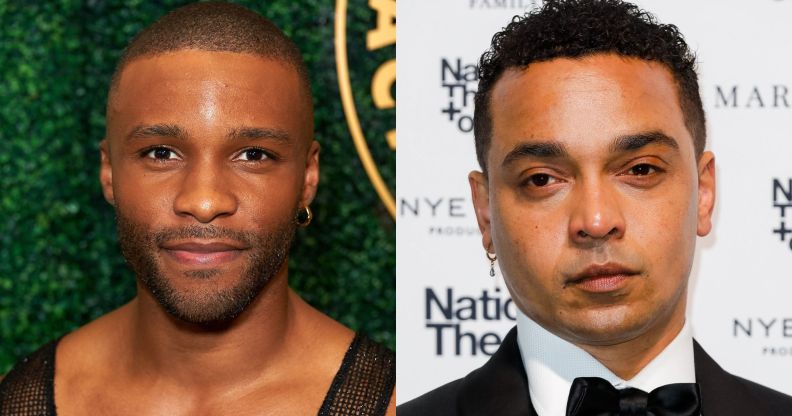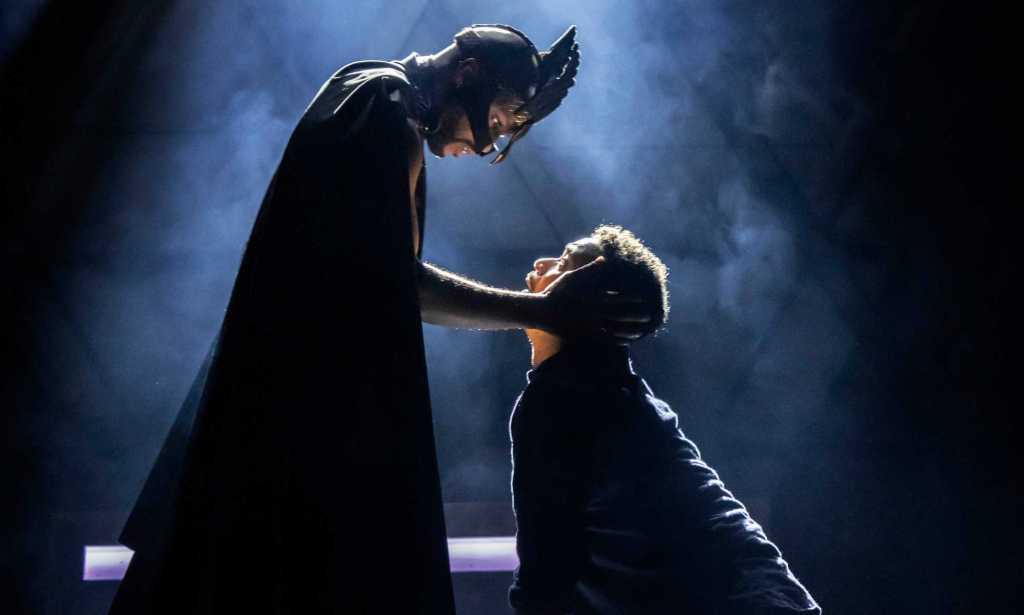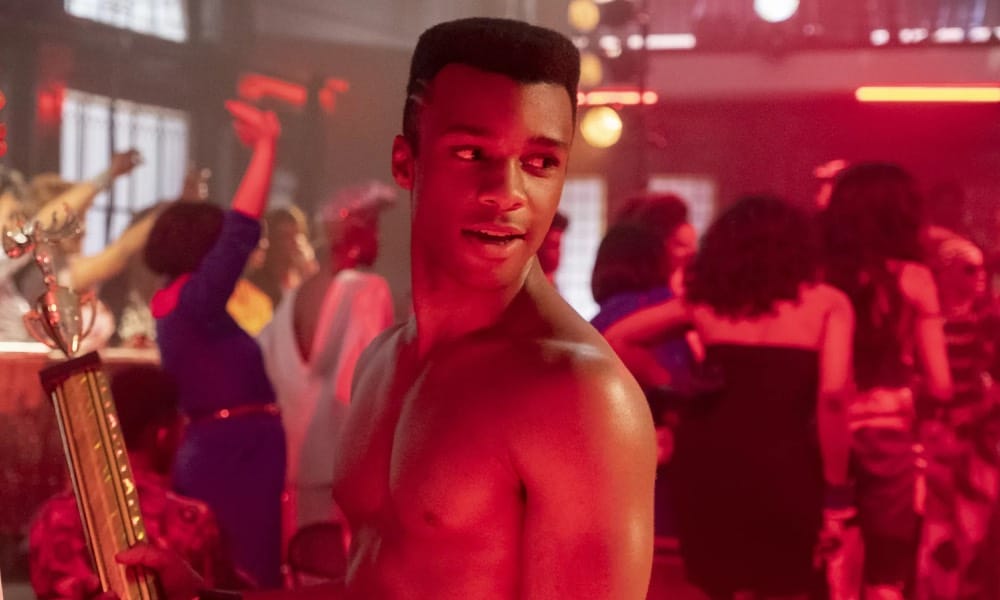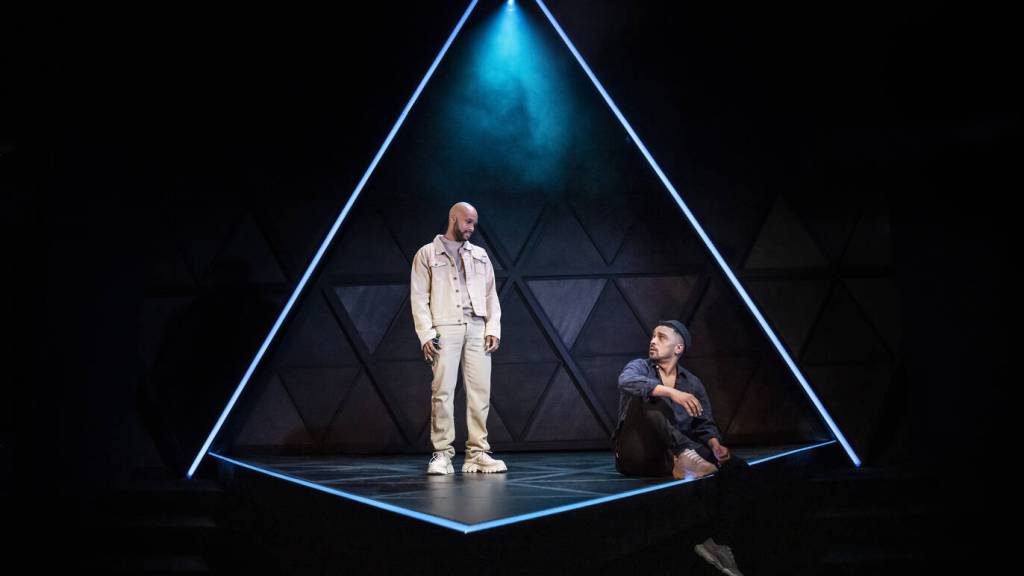Black Superhero: Pose star Dyllón Burnside on their new, unapologetically Black queer show

Dyllón Burnside and Danny Lee Wynter star in the unapologetically Black and queer play, Black Superhero. (Getty/Unique Nicole/ Tristan Fewings)
Across tube stations in London right now, there’s an image that might catch you off guard. Two Black men, one shirtless, embracing each other in a defiant display of queerness.
“It was really important to me to have an image for this play that was unashamedly, unapologetically Black and queer,” says actor, writer and Olivier Award nominee Danny Lee Wynter. “How many times do you see a picture on the underground of two black men being intimate?”
He’s sitting in the bar area of the capital’s Royal Court Theatre, the same theatre in which he used to work as an usher. Now, his debut play Black Superhero is on its main stage.
Until this week (3 April), Wynter himself starred as David, an insecure, waning actor approaching his 40, while Pose star Dyllón Burnside is King, an ultra-successful actor in a DC-style superhero film.
Black Superhero is a bombastic exploration of sex and identity, told by a group of Black and mixed-race friends. Before long, David and King become involved in a messy – but incredibly hot – f**k buddy situation.

Wynter knew this would be the first play he wrote. Growing up as a working class, mixed-race queer kid, he felt “othered” by those around him, his identity used as a “stick to beat” him with. Black Superhero was an opportunity to write a show that no one in the entertainment world would give space to, and a chance to unpack his younger years.
“I feel I’ve gone through the first years of my life, like many queer people, not having dealt with what those informative years did to me,” he says.
“In adulthood, like many gay men I know, both Black and white, I found myself running towards situations that are not right for me, that I feel can fill a void.”
Writing Black Superhero was cathartic. The characters, much like the experience Wynter describes, are complex and flawed. For Burnside, that’s exactly what drew him to the role of King.
“I am drawn to stories and roles that are challenging. Not just to me as an actor, but challenging for audiences,” he says.
Best known for his role as Ricky in Ryan Murphy’s LGBTQ+ drama Pose, Burnside spent time “manifesting” that his next lead role would be a superhero. This, however, is not a Marvel film repackaged into a stage show. Burnside describes it instead as a “peeling back the layers” of the Black, queer man behind his superhero persona.
“When we take on roles, we’re always looking for bits of ourselves to bring to the role,” he adds. “I definitely am allowing myself to mine some of my own experiences and my own struggles to bring King to life on stage.”
Though there is now more space on stage and screen for Black and queer stories, too often they are rooted in trauma: the stories of nasty coming out experiences and vile discrimination, or tales of loss during the AIDS crisis.

As a Pose alumni, which is set during the height of New York’s AIDS epidemic, and having had a recurring role in the highly controversial Dahmer – Monster: The Jeffrey Dahmer Story, which centres on the brutal murders of men of colour at the hands of serial killer Dahmer, Burnside knows a lot about popular culture’s reliance on suffering as source material. Is Black Superhero in any way similar?
“It is quite dark,” he says. “I think these characters do experience trauma.” In his view, though, depicting trauma has its major upsides.
“I think we all as human beings are experiencing trauma on the daily … There is something really powerful about examining the highs and lows of the human experience in art.”
Wynter’s character David is most evidently impacted by his past. In act two, he delivers an affecting monologue, in which the audience learn about the root of his battle with self-esteem. It sounds heavy, but Wynter is clear: Black Superhero harbours a lot of joy, too.

“I wanted to create something fun. I wanted to create something with the same energy that my friends and I welcome into our lives openheartedly,” he shares. There are references to Tiffany Pollard’s legendary stint on Celebrity Big Brother, and rib-cracking quips on everything from white, middle class liberalism, to the royal family.
“My ethos is that there is great pain and darkness in life, but there is also joy,” Wynter explains. “I feel like trauma porn happens a lot in theatre, particularly with the queer experience.
“I wanted to celebrate life, to lean into humour, to confront difficult conversations about my own community of queer Black men.”
With a theatre career spanning more than 15 years, Wynter has seen a lot in the industry – not all of it pleasant.
In 2014, he founded the Act for Change project, motivated by his own experience of racism in the arts. The charity intended to increase diversity on stage and screen – almost a decade on, and with a show like Black Superhero holding such a huge platform, can he say he’s reached his goal?
“It would be foolhardy of me to say that we’re further along just because I’m sat here at the Royal Court, and my play is going on the main stage,” he states.
“I can still count on one hand the amount of dramas from my community that come through to primetime TV each year. Of course, there’s been strides in certain respects, but overall, has there? I’m not so sure.”

Referencing Martin Luther King Jr, Burnside says that we’re faced with the “urgency of now” when it comes to telling Black, queer stories. As books that explore race and LGBTQ+ issues are being pulled from libraries at a frightening rate, any outlet to share the experiences of marginalised communities is a welcome one.
“Theatre and storytelling is an invaluable vehicle to shift culture and to reflect back onto ourselves some of our plight as human beings,” Burnside says. “[It] also creates a space for empathy with people and experiences that aren’t our own.”
Shows like Black Superhero can also provide a space of mutual understanding for communities who have long had their stories neglected. Wynter reflects back on the poster choice for the show, and that open display of Black queer intimacy.
“If I saw the image when I was 16 and I was uncertain, filled with shame… and I was Black queer teenager,” he says, “I might go to watch that play.
“And if I go to watch that play, I might feel that I’m not alone. Not only there are others, like me, but it’s camaraderie and friendship among us, as a community.”
Black Superhero is on stage at London’s Royal Court Theatre until Saturday 29 April.

